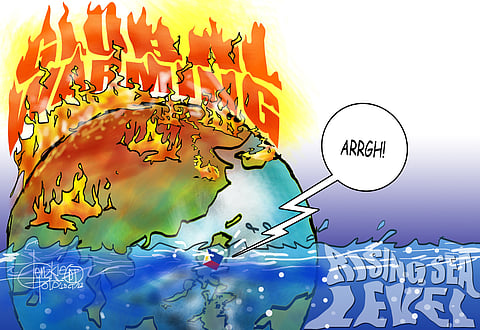

How serious is the damage caused by climate change?
Information on the website of the Philippine Climate Change Commission says the phenomenon — a long-term change in the average weather patterns that have come to define Earth's local, regional and global climates — aggravates the long-festering problems of migration, poverty, social conflict and political instability.
The CCC is the government's lead policy-making body tasked to coordinate, monitor and evaluate government programs related to climate change.
"It disproportionately affects the poorest of the poor through food insecurity, higher food prices, lost livelihood opportunities, and adverse health impacts," the CCC says.
The ordinary Filipino should get acquainted with the term "carbon emissions" — carbon compound, such as carbon dioxide, released into the atmosphere, often through human activity like the burning of fossil fuels such as coal or gas.
The CCC says the most immediate problem now is that the level of global carbon emissions will lead to a 4°C global warming scenario by the end of the century. Which is bad for humans.
"For vulnerable developing countries like the Philippines, 1.5 is that threshold of chance and hope. Limiting global warming to 1.5°C is still technically and economically feasible, but will require rapid and far-reaching transitions, especially in land, energy, industry, buildings, transport and cities."
"To contain warming at this level, man-made global net carbon dioxide emissions would need to fall by about 45 percent by 2030 from 2010 levels and reach 'net zero' by mid-century."
"This means that any remaining emissions would need to be balanced by removing carbon dioxide from the air."
Just "a 2°C temperature increase would exacerbate diminishing Arctic Sea ice, rising sea levels, and extreme
weather/climate events and second-order impacts, such as coral bleaching and degradation of ecosystems, among others.
There would be increased risks to health, livelihoods, food security, water supply, human security and economic growth."
There will also be "a reduction in crop yields and nutritional quality. Livestock are also affected with rising temperatures as reflected by the changes in feed quality, incidence of diseases, and limited water resource availability. Further, risks from vector-borne diseases like malaria and dengue fever are also projected to increase."
In other words, such levels of global warming — a direct consequence of climate change — will cause chaos.
What can people do to avert such a grim scenario?
Bill Gates, in his new book, How to Avoid a Climate Disaster, said in his discussions with people who have direct experience with the problem and who can offer solutions, he is convinced of three things:
"1. To avoid a climate disaster, we have to get to zero greenhouse gas emissions."
"2. We need to deploy the tools we already have, like solar and wind, faster and smarter."
"3. And we need to create and roll out breakthrough technologies that can take us the rest of the way."
"The case for zero was, and is, rock solid. Setting a goal to only reduce our emissions — but not eliminate them — won't do it. The only sensible goal is zero."
Here's what ordinary citizens can do, as suggested by https://www.priweb.org/blog-post/ten-ways-you-can-mitigate-climate-change:
"Tell companies that if they want you to buy their products, they need to be energy efficient, use renewable energy, and minimize waste. When it's time to replace appliances, buy the most energy-efficient ones you can afford. Switch to LED light bulbs and change your transportation."
"Conserve water. Check for leaks and fix them quickly."
"Eat less meat and more plant-based foods."
"Reduce food waste. Bring your own take-home container to a restaurant to take home leftovers and avoid using a disposable container. One-time-use containers waste resources and energy, leading to greenhouse gas emissions.
Compost uneaten food instead of sending it to a landfill where it releases methane when it decomposes."
